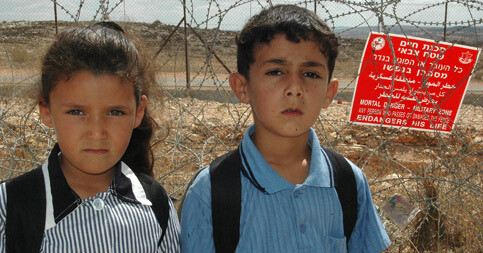IRIN 12 September 2006

Two young Palestinian school children stand in front of a barrier that seperates their home from their school. The sign says those who cross the barrier will be killed. (Edward Parsons/IRIN)
WEST BANK - Six months of a crippling international embargo on the occupied Palestinian territories (oPt) has brought its economy to a virtual standstill. As a result, children are being driven increasingly to find work to help support their families.
“After my father became jobless, I joined my friends to work at the checkpoint in order to support my 11-member family,” said Subhi Abdullah 16, referring to his unofficial job at al-Hawawer Israeli checkpoint in the West Bank city of Hebron.
The embargo followed the democratic election of a Hamas-led government in February. Hamas is considered a terrorist organisation by the West and Israel.
With a population of 4.2 million people, oPt comprises the West Bank, the Gaza Strip and East Jerusalem.
While plans were announced on Monday for a Palestinian unity government that could meet conditions to have the embargo lifted, ordinary Palestinians continue to suffer.
According to the Palestine Central Bureau of Statistics (PCBS), 40,000 children under 18 work in oPt - 73 percent of whom were forced to work due to severe financial conditions.
Subhi goes to al-Hawawer checkpoint every morning, dragging his steel handcart behind him. He competes with other boys to get two or three shekels (45 to 70 US cents) a time for carrying the luggage of travellers.
Forty percent of the West Bank has been under the limited civilian jurisdiction of the Palestinian government since the Oslo Accords were signed in 1993, while Israel maintains overall control - hence the checkpoints.
“One man’s poison is another man’s meat,” said Subhi, when asked what he felt about the existence of the checkpoints.
Israel has set up hundreds of checkpoints across the West Bank for “security reasons”, its army says. These checkpoints make it difficult for Palestinians to move freely from town to town; sometimes even from village to village.
Subhi said he leaves home at daybreak. He goes to school first, then to the checkpoint. By the time he gets back home in the evening, he is completely worn out. “My studies have been negatively affected. I do not have enough time to study. I think it is useless,” said Subhi.
Abdul Rahman, 14, from al-Khader village near Bethlehem, works at the al-Khader checkpoint. He prefers working than going to school.
“I impatiently wait for the school bell to ring. And when it does, I take my handcart, which I leave beside my school, and rush to the checkpoint. I leave my school bag with my younger brother, who takes it home,” Abdul Rahman said. “I start looking around with my colleagues to get travellers’ bags and transfer them to the other side of the checkpoint.”
While these checkpoint children or ‘the little porters’, as they are sometimes called, are of great benefit to travellers, NGOs and relief agencies are concerned with their welfare and with the impact of the checkpoints on the Palestinian population.
The United Nations Children’s Fund (Unicef) has said that the prevalence of checkpoints coupled with Israel’s intermittent curfews are hampering the education system in oPt. More than 225,000 children and 9,300 teachers in the West Bank face a daily struggle to get to school
According to the children’s agency, two thirds of Palestinian children live below the poverty line (US$2 a day), 38 percent of Palestinian children are anaemic and 23 percent of students and 36 percent of teachers are unable to get to school on any given day.
A Palestinian Child Draft Law states that it is forbidden to employ children below 15 years of age. It stipulates that the state should take all appropriate procedures to rehabilitate working children - physically and psychologically.
While the little porters continue to relieve travellers’ burdens, no one is helping them relieve theirs.
This item comes to you via IRIN, a UN humanitarian news and information service, but may not necessarily reflect the views of the United Nations or its agencies. All IRIN material may be reposted or reprinted free-of-charge; refer to the copyright page for conditions of use. IRIN is a project of the UN Office for the Coordination of Humanitarian Affairs.
Related Links